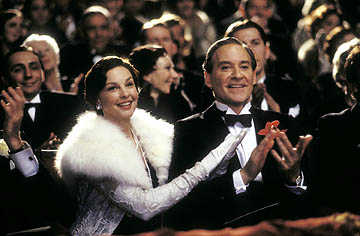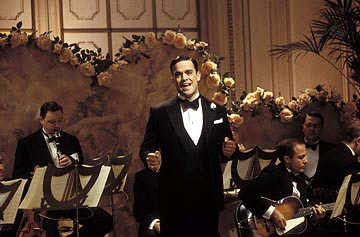

Some movie executive probably though it would be cool to take a bunch of today's famous singers and have them sing songs from Cole Porter in De-Lovely, his film biography. It sounds a lot like the concept behind the television series American Dreams, where today's singers play dress up and perform old hits from American Bandstand. There is one huge flaw in this idea. While people like Sheryl Crow and Alanis Morrisette may be good in their respective genres, they mangle Porter's difficult to master songs and cast a pall over an already mediocre film. When a singer is good, like Robbie Williams, the film cuts away and relegates him to the background while dialogue plays over his voice. Otherwise, the concept is all over the place, and is more likely to sell soundtracks than contribute to a good film.
Instead of a straightforward approach to telling Porter's life, director Irwin Winkler (Life as a House, At First Sight) and writer Jay Cocks (Gangs of New York, Strange Days) frame Porter's life as a sequences observed by Porter (Kevin Kline, The Emperor's Club, Orange County). His friend Gabe (Jonathan Pryce, Pirates of the Caribbean, What a Girl Wants) is presenting Porter with a show about his life, performed by everybody he knew with a special emphasis on his wife Linda (Ashley Judd, Twisted, Frida). Thus, the film awkwardly moves from flashback to the stage with an elderly Porter observing and providing commentary. This framing sequences succeeds only in jarring anybody watching out of the groove and rhythm of the De-Lovely.
The problem is that De-Lovely is very boring, and very long. Part of the issue with the running time is due to the large number of song-and-dance numbers, but the quality of these is all over the place. Winkler has some great actors, but they have absolutely nothing to act upon. Cocks' script is superficial and merely touches upon most of the important points in Porter's life without examining him as a person. It was an open secret that Porter was gay (a secret ignored in the 1946 biopic Night and Day), and that his marriage to Linda was purely platonic. Still, the two were tremendous friends, and Linda was a huge inspiration for Porter and his burgeoning success. As Porter rose to stardom, his relationship with Linda strained.
Nevertheless, it is very hard to care about such flat one-dimensional characters. Okay, Winkler portrays Porter as gay. So what? It doesn't add any sort of dimension to Porter's life aside from filling out a biographical sketch. Kline is such a wonderful actor, and one wishes he had a great script to work with, as here he is very mediocre. For every emotion that Kline shows, Judd has even less. She looks magnificent in an array of vintage costumes, but there is no sense of life between the two. Nobody can understand where Porter's inspiration came from, or his great love of music. The only sense of vitality comes from the songs, so there is a disconnect between the emotional content of the songs and the emotions of their author.